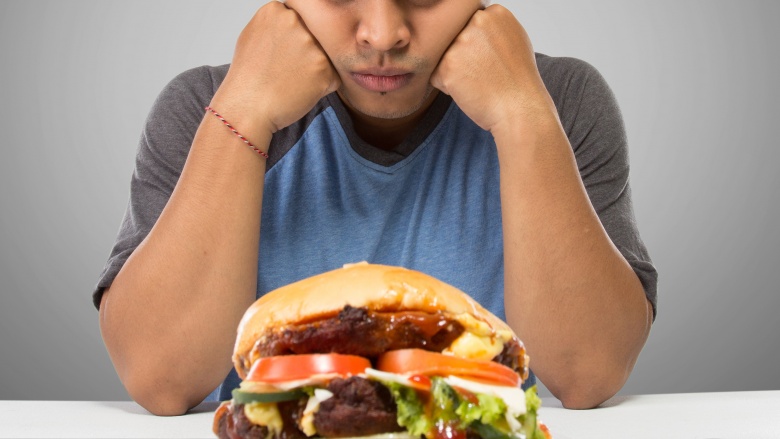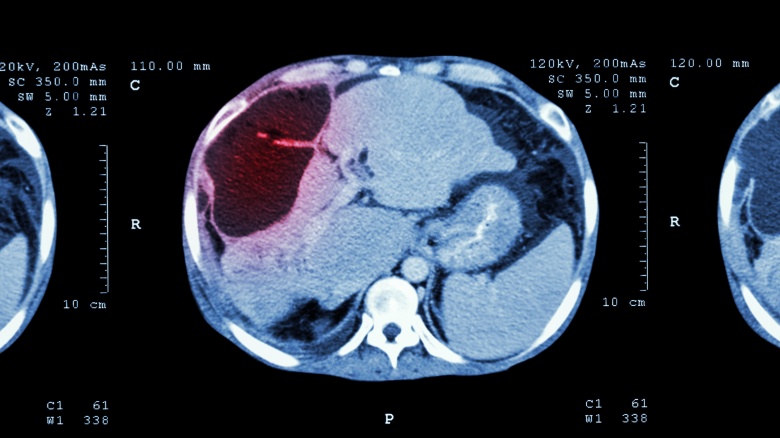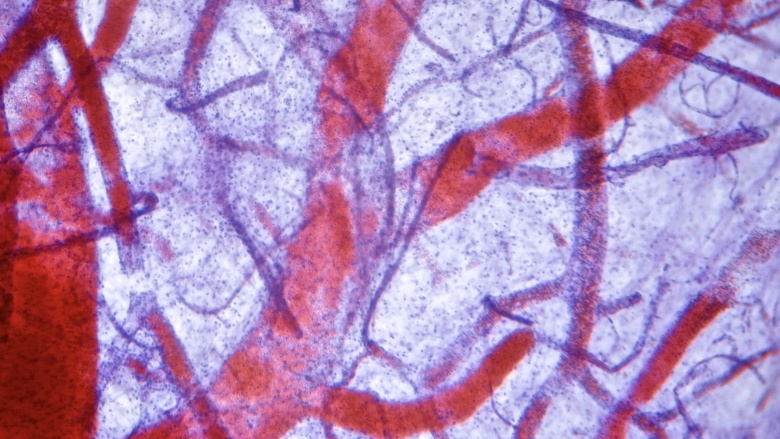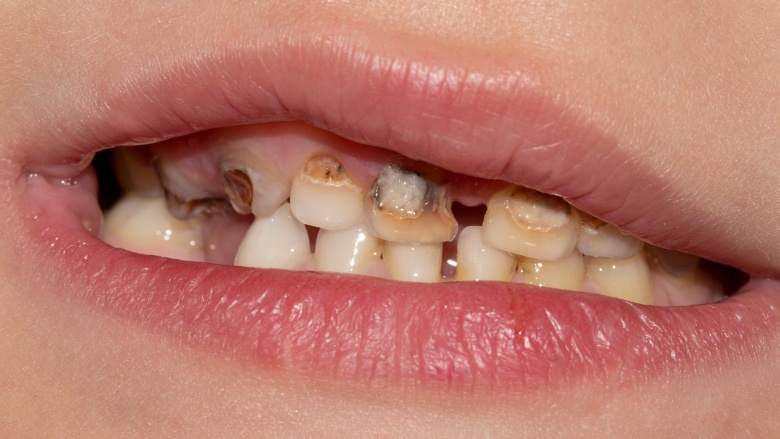What Really Happens To Your Body When You Eat Only Fast Food
If you're one of those people who stop for a breakfast sandwich on the way to work, head out to grab fries and a shake for lunch, and hit the drive-thru on the way home from work ... how the hell are you still a functioning human being? We've all heard the horror stories about how eating nothing but fast food isn't good for your waistline, but there's much, much more to it than that. And you're not going to like any of it.
It wipes out your gut bacteria
We hate to break it to you, but you and all our good friends are festering meat-bags full of bacteria. And we mean that in the nicest possible way. More and more research is being done on the bacteria that lives in our digestive tract, and we're finding that it's responsible for more than just processing our food. That bacteria is what allows our body to absorb nutrients and, in turn, helps balance our mood, boost our immune system, and even keep things like irritable bowel syndrome away. Everything they do is a good thing, because honestly? Who wants something with a name like "leaky gut?"
Go on an all-fast-food diet, and one of the first things that's going to wave the surrender flag is your gut bacteria. Tim Spector, a professor of Genetic Epidemiology at King's College, wanted to see what kind of impact fast food had on the little critters living in your gut. He recruited his son to eat nothing but fast food for 10 days, who then give up a sample to see how his gut bacteria had fared. It wasn't good. He not only lost most of the bacteria responsible for suppressing inflammation, but he also lost entire species of bacteria. More precisely, he lost 1,400 species. Not individuals, mind you. Species. Thanks, Dad!
That number is insane. Studies have shown that the more diverse your gut bacteria is, the more functions they have and the healthier you are. Those 1,400 species accounted for about 40% of his gut bacteria, gone in just 10 days of eating nothing but fast food. There's a lesson to be learned here, and it's that even bacteria doesn't like Big Macs.
You'll get more and more depressed
Depression sucks — there's no if's, and's or but's. There's plenty to be depressed about in our modern world — just turn on the television and you'll find plenty of reasons. But studies have shown that eating fast food (and other kinds of junk food) are also linked to depression, and the more you eat? The worse you'll feel.
One study of 8,954 people, conducted by the University of Las Palmas de Gran Canaria and the University of Granada found that, when they looked at the amount of fast food people ate and how depressed they were, those that ate the most fast food were a staggering 51% more likely to report suffering from depression. More than that, they also found that the more fast food people ate, the deeper the sad-sack rabbit-hole went. Their threshold for depression wasn't just feeling a bit down-in-the-dumps — it was a clinical diagnosis of depression and a prescription of antidepressants.
That particular study backs up data from other, similar studies, but no one's quite sure just what about fast food triggers such a massive correlation between consumption and depression. One guess is that the nutrients you're missing out on (like omega-3 fatty acids) have something to do with helping to regulate your mood, and it's likely there's a connection to gut bacteria and mood, too. Wouldn't that be great if, one day, instead of being prescribed antidepressants, we could be prescribed a picnic lunch of fresh, homemade foods, and an extra hour for our lunch breaks?
It increases the risk of asthma
Somewhere around 26 million people in America alone suffer from asthma. That includes around 7 million children and, typically, people have different triggers for their asthma. Common ones can include exercise, stress, allergens, certain foods and even certain food additives ... see where we're going with this one?
In a massive study on asthma, called the International Study of Asthma and Allergies in Childhood, researchers took a look at 500,000 kids from 31 different countries. They were looking to see what it was that made kids and teens more likely to develop asthma, and if you guessed they found a correlation between fast food and breathing trouble, congratulations, you've been paying attention. They found that it took eating fast food only three times a week to raise the likelihood of developing asthma by 27% in children, and 39% in teens. Not only is that a significant statistic, but fast food was the only food group found to have any absolute impact on any respiratory problems.
Why? Researchers aren't yet sure, but they do suggest it has something to do with the amount of saturated fat in fast food. Put high amounts of that crap into a growing body, and it'll have a dampening effect on the immune system. That, in turn, makes people more susceptible to the negative effects of allergens and allergies. Speaking of which ...
It also ruins your skin
Acne and oily skin are big enough problems when you're a certain age, and the same International Study of Asthma and Allergies in Childhood found a link between fast food consumption and breakouts, too. They think it's likely the same mechanism at work. Fast food contains all sorts of nastiness that makes our bodies less capable of regulating themselves, and more likely to be susceptible to outside factors, like allergens and irritants.
When it comes to skin issues and (specifically) eczema, it only took eating fast food three times a week to send the likelihood of developing issues skyrocketing into the double digits. The correlation seemed to be proven even more when researchers found there was absolutely a way to combat potential problems: a few servings of fruit. Let's face it — growing up is hard enough as it is. You're just learning to navigate your way through the world and it's only going to get harder, so why do it with bad skin and asthma if you don't have to?
It causes major liver damage
When we say "liver damage", what's the first thing you think of? Alcohol, isn't it? It was for us, though to be fair, alcohol is the first thing we think of a lot. The fact that liver damage can be caused by a fast food diet in just a week sounds like the stuff of clickbait headlines, but it's absolutely true.
One of the major studies was done by Sweden's Linkoping University, which gave their volunteers fast food twice a day for a month, along with instructions not to walk more than 5,000 steps a day. They were trying to increase their weight, which you'd think would be the weirdest part of the whole study. But nope, it gets weirder. When they tested the volunteers' liver function, they found that their levels of liver enzymes were higher than average, and the fat content of their liver cells had increased from 1.1% to 2.8%. That's ... not a good thing.
We've known for a long time that the liver can be incredibly resilient (if it can handle Bacardi 151, it can handle anything), so taking the idea that fast food can slowly start to suffocate the organ, the Saint Louis University Medical Center studied what happened when you stopped choking down Whoppers every day, and started a healthier diet. They found that you absolutely can reverse the damage (which is done mostly by eating too many calories, sugars and fats), as long as you limit fast food, avoid overly sugar-laden everything, and get off the couch and exercise, you lazy bum. That's all incredibly good news, especially considering the number of kids and teens they've seen starting to develop cirrhosis. Seriously, people, lay off the McD's. What more do we have to say?
Your brain slows, and your risk of dementia increases
More, you insist? Fine. How about the findings that not only does a fast food diet physically slows down, but mentally, too?
An Ohio State University study looked at whether or not there was a correlation between test scores in kids and just how often they ate fast food. Surprise! There absolutely was. Around 8,000 kids from across the country were tested, and those that ate fast food just three times a week showed consistently lower scores in school. When UCLA stepped in and started combining the results of smaller tests that studied the correlation between fast food and brain function, they found a pretty clear pattern. More fast food meant not only lower test scores, but an increase in behavioral problems, too.
Researchers think that it comes down to our old friend, omega-3 fatty acids. That's the compound responsible for reinforcing the synapses and connections between the neurons in the brain, and it's also a compound not often found in fast food. Cut that out of your diet? You're going to pay for it now, and maybe later. Survive on the fat, sugar, and calories from fast food in your youth, and you'll likely be more susceptible to senility in your older years. Brown University researchers found that all those things that absolutely aren't good for you do more than just make you fat. They build up in your brain, make your brain cells stop responding to insulin, and prevent the formation of new memories and thought patterns.
Sound familiar? That's right, boys and girls — it's a condition that leads to things like dementia and even Alzheimer's. You might wind up forgetting you ever ate fast food, as well as forgetting everything else, like your loved ones.
You build up a resistance to insulin
And speaking of building up a resistance to insulin, let's talk about that for a minute. First off, what the heck is it? It happens when cells stop absorbing glucose from the blood stream, and higher and higher levels of insulin are needed to keep everybody in the body pool doing what they're supposed to do. It's the first step to developing diabetes, and no one wants that.
In 2005, researchers from the University of Minnesota wrapped up a 15-year study on fast food intake and insulin resistance. They found that it only took eating a fast food meal twice a week over that decade-and-a-half to gain an average of 10 more pounds that those who didn't gorge themselves on KFC and Whoppers. The fast food eaters also showed twice the levels of insulin resistance, and that's only with two meals a week. Imagine if that's all you ate. Can you hear your blood cells screaming?
It's a huge problem, too — between 1980 and 2002, the cases of insulin resistance in the adult population doubled. In the 11-18 year-old range? It's increased tenfold. While there's some things we'd love to see that kind of increase in (per capita puppy-kisses, perhaps?), insulin resistance isn't one of them.
Your heart suffers, too
The idea of a mandatory, world-wide increase in puppy kisses (or kitten head boops, if you're a cat person) might have your heart all a-flutter, but there's bad news on that front, too, at least when it comes to fast food. The University of Minnesota's School of Public Health conducted a 16-year study on the impact fast food has on your heart. The results were pretty staggering, and they concluded that eating fast food just once a week increased your risk of dying from heart disease by 20%. That Baconator isn't looking so good now, is it?
They also found that the more fast food you ate, the more that went up. Eat it two or three times a week? That percentage increases to 50%. Eat fast food four or more times? You're 80% more likely to develop (and die of) heart disease. The study tracked the eating habits and health of 52,000 Chinese people living in Singapore, and they chose that particular group because it's only relatively recently that the nightmare that is Western fast food was introduced to them. Until then, they were, as a society, at low risk for developing heart disease, diabetes, and other cardiovascular problems. So what do those percentages mean in numbers, anyway? Over the course of the study, 1,400 participants died of heart disease and cardiac arrest, while 2,300 were diagnosed with type 2 diabetes.
Dear Rest of the World: don't say we've never given you anything. Also, we're so sorry.
Your blood vessels immediately clog, and your stroke risk increases
Right, so we're almost done. Almost, but not quite. The University of Calgary took a look at the short-term effects of consuming fast food meals, and they found that if you're hitting the drive-thru for a giant coffee, a bacon-egg-bacon-spam-sausage-spam-egg-bacon-sausage-spam breakfast sandwich and some orange juice (gotta be healthy, after all), you're going to be feeling it by lunchtime. And we're not talking about that "I ate too much feeling" — we're talking about the restricted blood flow that's going through your arteries.
The findings proved that a single fast food meal can have serious, almost immediate consequences. Just two hours after subjects had their fast food breakfasts (which was just a regular, standard breakfast sandwich), they had anywhere from 15 to 20% less blood going through their bodies. It's called the VTI, or velocity time interval, and in short? The higher the number, the healthier your arteries are. The subjects in the study had their VTI return to normal pretty quickly, but they were also healthy adults.
So what's that mean in the long run, and when fast food meals happen all the time? A study done in Nueces County, Texas, looked at the correlation between the concentration of fast food restaurants and strokes. The verdict? The more accessible fast food was, the higher the instances of stroke in a community. The correlation seemed so straightforward, the study declared fast food a public health risk, and that makes sense. The easier it is to get, and the more variety you have, the more likely you are to eat it.
Your teeth will rot
Still not convinced there's absolutely nothing good that can come from a fast food diet? (And we use "diet" in the loosest of ways.) How about some rotten teeth to change your mind?
A look at children from 1988 to 2004 showed a massive increase in dental problems in children, and the study took everything a step further. They looked at not only the number of instances of dental problems in children, but instances of obesity coupled with malnutrition. That's a particularly terrible thing, and it happens when children (and adults) consume massive amounts of fat, sugar, and calories, without getting any of the vitamins and nutrients they need. In short, fast food.
Dr. Karen Sokal-Gutierrez, a UCSF-Berkeley Joint Medical program pediatrician, found another example of just how much damage fast food can do to our dental health. Serving with the Peace Corps three decades ago, she wrote about the flawless smiles of the children from El Salvador. Since then, fast food and sugar-heavy drinks have invaded the country, and now? Those smiles are less "flawless" and more "toothless."
It's very, very visible evidence that all the extra sugar and empty calories cause serious havoc in almost every part of the human body. There's nothing good that can come of eating nothing but fast food every day, and we absolutely mean that. Now, we're going to go have an apple.










